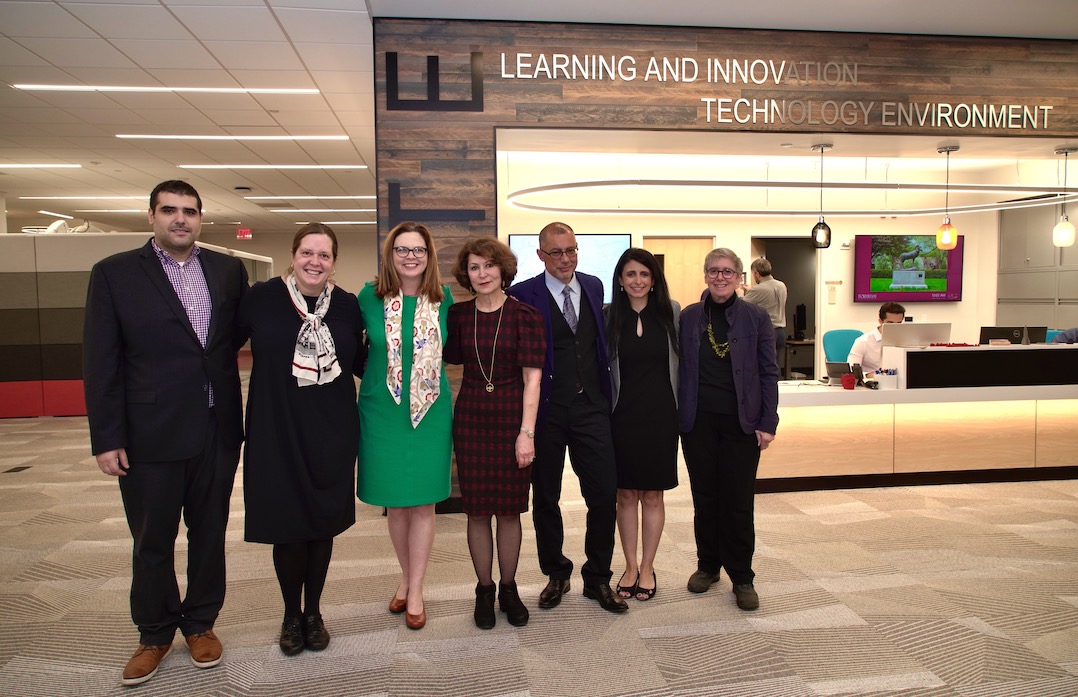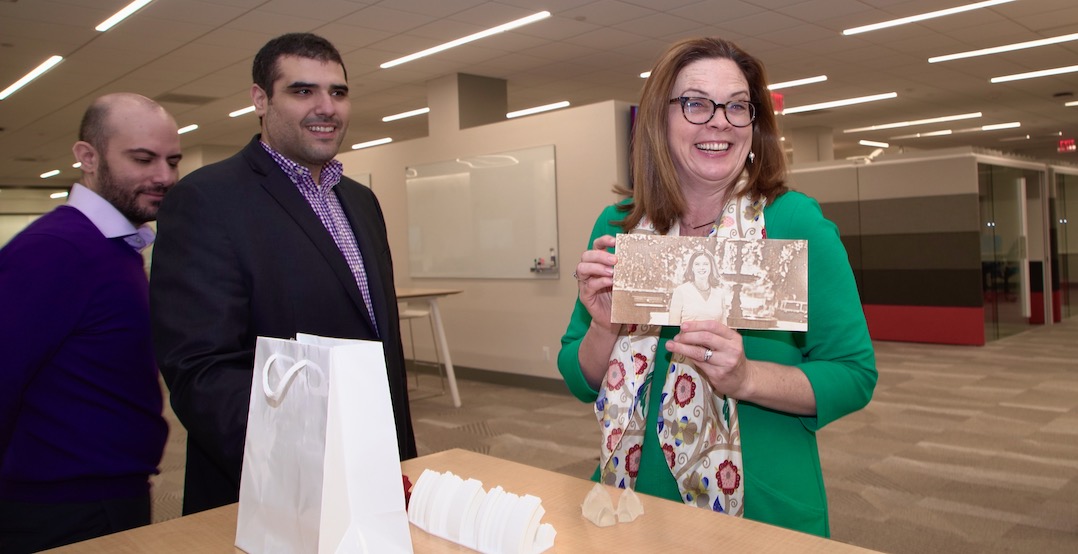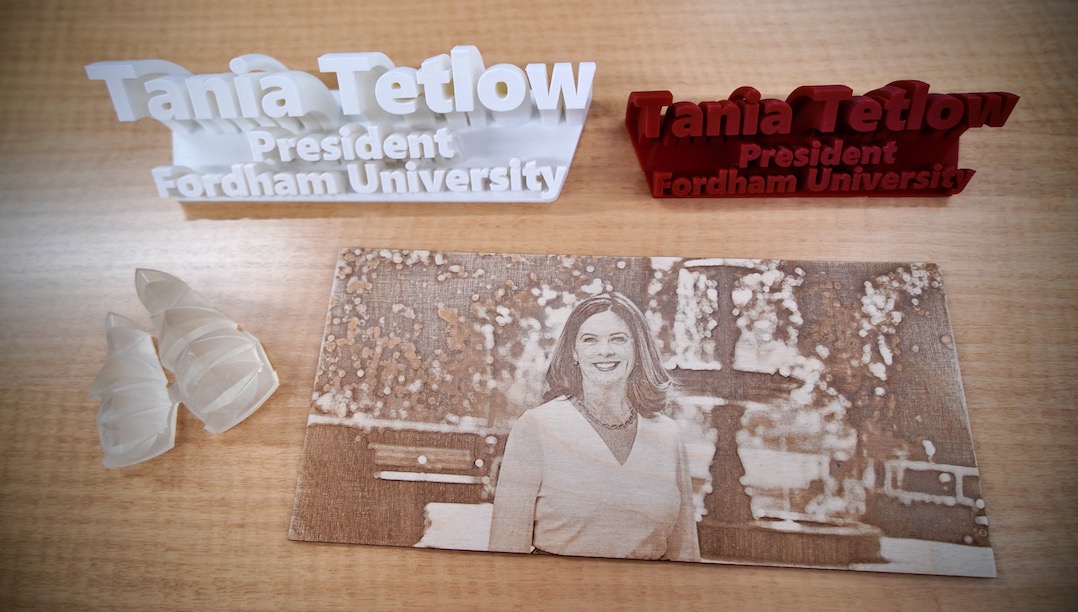“There’s something really important about the fact that we are in the business of teaching,” said Tetlow. “If there’s anyone who should understand how to spread information, how to help people understand—it’s us. So how do we model our own pedagogy with each other?”
Tetlow spoke on the Twice Over Podcast, which was developed during the beginning of the COVID-19 pandemic as a way to find meaning and connection during a turbulent time. Over the past two years, it evolved into a platform where students, faculty, administrators, and guest speakers at other academic institutions share effective practices in their work and build connections through candid conversations. More than 40 guests have been interviewed by the podcast’s two hosts: Steven D’Agustino, director of online learning, and Anne Fernald, special advisor to the provost. They conduct recording sessions in a sound-controlled studio within the Learning, Innovation, Technology Environment, a new center in the basement of Walsh Library where students, faculty, and administrators use cutting-edge technology for their research.
The podcast episode featuring Tetlow was published on Nov. 28. For nearly an hour, Tetlow speaks in depth on many topics, including why she decided to work in higher education and how her second grade teacher changed her life. The podcast episode can be streamed on Twice Over’s website, Apple Podcasts, Spotify, Stitcher, SoundCloud, and YouTube.



They’ll find some helpful advice in the new Twice Over podcast.
The brainchild of hosts Anne E. Fernald, professor of English and women’s, gender, and sexuality studies and special advisor to the provost for faculty development, and Steven M. D’Agustino, director of online learning, Twice Over is a spinoff of the town hall meetings Fernald and D’Agustino have both recently hosted to assist faculty members with the transition to distance learning.
Titled Twice Over “because to teach is to learn twice over,” the podcast hopes to provide “asynchronous advice” to faculty, with compelling conversation between the hosts and potential guests, questions from listeners, and interviews with people in the Fordham community.
Their inaugural episode, It’s Okay to Look like a Potato on Zoom, debuted on March 25 on SoundCloud. It includes discussion about “how to stay connected to our love of teaching as we struggle to redefine our classes and rethink our practices.” Check their SoundCloud page for new episodes. The podcast can also be found on Stitcher and Spotify.
Follow the hosts on Twitter @twiceover1, and email them at [email protected].
So when Fordham ceased face-to-face instruction at 1 p.m. on Monday, March 9, due to the threat posed by the COVID-19 outbreak, faculty were faced with the challenge of providing quality instruction that was true to their mission of supporting students and continuing to foster their potential. On March 13, the decision to suspend face-to-face classes was extended through the end of the semester.
As they begin to deliver instruction remotely, faculty have turned to online tools such as Zoom, WebEx, Blackboard, and Google Hangouts to continue students’ education. And they have turned to each other for support, guidance, and tips.
Planning for the transition began in earnest during the last week of February, when Joseph M. McShane, S.J., president of Fordham, and Dennis Jacobs, Ph.D., provost and senior vice president for academic affairs, briefed members of the Faculty Senate at its monthly meeting on February 28. Administration officials had been monitoring the spread of the virus in China, and once a case had been reported in Washington state in January, they thought it might spread throughout the United States.
Jacobs said that at that time the University was already making plans to offer online instruction to students who’d been recalled from study abroad programs and who would need instruction while self-quarantining.
“That was the call to action, to say, ‘Let’s begin preparations,’” he said.
“No one would have chosen this as a normal transition path, but these are extraordinary times, and our options were limited,” he said.
“Everyone was committed to serving our students and allowing them to progress towards their academic degrees. It was not just an option to shut down the campus, we had to come up with a continuity plan.”
Technology and Pedagogy
Making the transition required overcoming challenges both technical and pedagogical. Steven D’Agustino, Ph.D., Fordham’s director of online learning, is helping faculty figure out how to best use that technology to deliver their coursework. He’s offered videos and documentation on the University’s Official Online Learning Page and his blog, Learning at a Distance.
D’Agustino said he was impressed at how seriously faculty have put students’ well-being and peace of mind first and foremost. Many are using this week, which happens to be spring break, to explain to their students how they plan to move forward with the rest of the semester and taking steps like telling them exactly what times of the day they’ll be checking their emails. Faculty are establishing virtual office hours when they’ll be available for in-person consultation, and giving serious thought to whether future classes should be held synchronously, when everyone meets together, or asynchronously, which enables students to access material on their own schedules.
D’Agustino encouraged faculty to evaluate their methods as they go, and to draw on the experiences of peers across the country who face the same situation.
“I would say reflective practice is really valuable. This about what you’re doing, and reflect upon it after you’ve done it, and try to include your students and your colleagues in those reflective spaces. Because I think there are a lot of good ideas and support out there, and we’re not alone.”
A Quick Turnaround
Eve Keller, Ph.D., professor of English and president of the Faculty Senate, said she was astonished at how quickly faculty, who teach nearly 2,000 courses a semester, were able to work together to make the transition.
“Faculty had 36 hours to convert their classes online. Some people have done this, and some people had never heard of Zoom, but from what I’ve seen, it’s been an unequivocally congenial, collegial effort to make it happen,” she said.
The transition has not been without occasional hiccups. Anne Fernald, Ph.D., a professor of English and special adviser to the provost for faculty development, emailed fellow arts and science faculty for thoughts on pedagogy on March 11, and after receiving 20 replies, she felt prepared.
Still, when she attempted to teach her first class on Thursday with WebX, she didn’t realize the program’s default volume setting for the program is mute. She ended up recording a podcast for it with the information she planned to share, and is confident she’ll be able to make it work next week, when spring break ends and classes resume.
“I felt like the University did everything it could in this emergency to support us. And I think that the decision to be closed on Tuesday and give people time to prepare was huge. I had colleagues all around the country who didn’t have anything like that. Fordham did it in a way that was as compassionate as it could be,” she said.
Striking the Right Balance
On March 12, Mark Conrad, an associate professor of law and ethics at the Gabelli School of Business, taught three courses—Legal Framework of Business, Sports Law, and Law and the Arts—using the Zoom platform, and was happy with how it came together.
“I’ve been pleasantly surprised at how easy and accessible it has been. I had a number of questions from students. I wasn’t just talking to a computer,” he said, noting the ease in which he was able to share power point slides with students.
“We’re seeing future possibilities. It deals with something I’ve been thinking about which is, let’s say the professor is ill or has a sprained ankle. One could do classes like this, and it could actually minimize absences.”
Nicholas Tampio, Ph.D., a professor of political science, taught two classes on March 11 using WebX seminar after department chair Robert Hume, Ph.D., arranged practice sessions for the department. While they went off without a hitch, he said it was hard to read the mood of a room, as many nonverbal communication cues were lost in translation.
“When you teach online, you can’t see feet shifting, or if they have another browser open where they’re checking email. Their parents could be in the room, there could be a car going by. It’s not a controlled environment in which students are only there for the experience,” he said.
“I think I’m going to get better over time at being able to call on people, and I think I’m going to get better at organizing my slide show to make it more entertaining,” he said. But he acknowledged that face-to-face learning will always be preferable.
Edward Cahill, Ph.D., a professor of English, had never used Google Hangouts before and turned to it to teach Shakespeare’s sonnets and John Milton’s Paradise Lost. He found it to be similar to the normal classroom experience, although he said he plans to try different approaches to keep things interesting when the semester resumes, including splitting the class into both synchronous and asynchronous sessions.
Cahill’s new familiarity with online learning comes not only from his work as a professor, but also a student. His experience as a student in an entry-level Spanish class taught by Guillermo Severiche has given him hope that success is possible in the online realm, he said. Severiche, an instructor in the department of modern languages, moved their class to Zoom as well.
“We share documents, we used the e-textbooks. He managed the whole thing flawlessly. So that inspired me to think maybe I can do more.”
Cahill noted that he’s trying to be mindful of the challenges inherent in asking students to complete studies in the midst of a worldwide pandemic.
“There are so many balances to strike between rigor and flexibility, generosity and intensity. I don’t know that anyone has figured it out, and I guess as long as we can stay alert to all of those tensions, we’ll probably find our way through it,” he said.
Doing Lab Work Without the Lab
In some fields, resuming instruction is trickier than just establishing online connections. Stefanie Bubnis, interim managing director of the Fordham Theatre Program, said that while mainstage productions have halted, faculty have bolstered instruction on Google Hangouts and Zoom with old fashioned phone calls and FaceTime.
Professors such as Ann Hamilton, an adjunct professor of theater, are learning on the fly as well. For her first online Acting for the Camera class, she asked students to upload the scenes they recorded of themselves to Hightail and Google Drive. She watched the videos during the designated class time and wrote feedback in a group email to the 17 students in the class. Ultimately it proved to be too time-consuming.
“For my next class I intend to use Zoom, so we are all conferencing together, but they will have sent me the recorded auditions first, so I can have them up on my desktop and we can all watch them together at the same time and actively participate in the feedback. I think the students felt as if they learned a lot today, so that’s a win, given the circumstances,” she said.
Stephen Holler, Ph.D., an associate professor of physics, was able to move the lecture for his General Physics 2 class exclusively to Blackboard, but that wasn’t an option for Experimental Techniques for Physics, a course where teams of students had been working on a single project all semester.
“Some of the work, they’re in the machine shop, they’re doing 3D printing, they’re doing electronics,” he said, noting that this work will have to be completed in a different way than planned.
“Since they’ve done half the project, and they’ve already written up progress reports, I’ll have them turn those progress reports into a paper. Normally I’d also have them do a presentation on a research project they’re interested in; instead I’ll have them write a short paper on that and we’ll do Zoom presentations.
A Big Shift for Information Technology
For Fordham IT, the switch required an unusually speedy response.
Alan Cafferkey, director of faculty technology services, noted that his team—which includes experienced technicians, a fine arts and digital humanities professional, instructional designers, a former math teacher, a librarian, adjunct professors, a media and accessibility expert, and an Ed.D. candidate—normally prefers to work with six months lead time to develop an online course.
“This, however, was everyone already two months into the semester with only a couple of weeks of realizing that something might happen, prepping, and then a sudden shift, with hundreds of people making the change,” he said.
He was especially proud that his team was so on top of responding to the multitude of individual faculty requests. In addition, in collaboration with the provost’s office, they created a Course Continuity site before the University shifted to online learning—as preparation for what might happen.
When the switch was made, IT as a whole simultaneously shifted its entire operation to function remotely—including the IT Customer Care help desk—while helping other offices do the same.
IT also rolled out an entirely new enterprise-wide system in Zoom, reinforced numerous systems, and conducted a multitude of workshops on topics such as teaching synchronously and asynchronously, setting up remote offices, and best practices for many popular web tools. Additional workshops will continue through the spring and can be found on the department’s blog.
Going forward, Cafferkey said the department will continue to field faculty questions and requests, work closely with vendors such as Blackboard, and support other University initiatives as needed. He credited the efforts of colleagues across IT, the provost’s office, the IT departments in the Gabelli School of Business and Fordham Law, the online learning teams at the Graduate School of Social Service and the Graduate School of Education, and the staff at Fordham’s library.
“I’ve been really touched at how kind most of the faculty have been about the support provided. I’ve gotten so many thoughtful notes and comments, it’s been really heart-warming. It’s helped that there are so many offices working collaboratively,” he said.
Looking at the Big Picture
Lisa Holsberg, a Ph.D. candidate in theology, found herself transitioning Great Christian Hymns, which she is teaching for the School of Continuing and Professional Studies (PCS), entirely online. But she was in some ways already prepared to do so, as she is also currently teaching an online course, Christian Mystical Texts, for PCS. She was already accustomed to using Blackboard extensively, as well as Screencast-O-Matic and Voicethread, which lets students listen to each other talk, in their own words, about a specific problem. But ultimately, technology is just one little piece of the story, she said.
“It’s really, what is your commitment to students and to learning and going forward in the midst of change? How do you rethink what it means to teach, what it means to learn in conditions you’re not used to? You have to really dig deep into what your fundamental commitments are to your teaching, your students, to yourself, to your topic, and then just use whatever tools you have in order to meet those goals,” she said.
The Path Forward
Going forward, D’Agustino said he thinks faculty will settle into a hybrid approach for the rest of the semester, making tweaks as they get feedback from students.
“They may say, ‘We’re going to do a synchronous session, so here are the slides in advance, here is the reading material, here’s the study guide, there are some questions you should be able to answer during the session,’” he said.
“So even if a student can’t attend or log in, they still have the notes, the readings, the study guides, and they can say, ‘Professor I couldn’t log in; its 4 a.m. for me. But here are the answers to those questions. And the faculty member can, if it’s part of their protocol, share those answers with the class so that student is part of it.”
Jacobs said that he’s hopeful that faculty will rise to the challenge in what is an extraordinary time of upheaval. He noted that online instruction will always have a place in graduate level and professional-oriented instruction, especially for students who are working or have family obligations. As such, the University will continue to evaluate it on a case-by-case basis. But face-to-face teaching and learning is at the heart of Fordham’s mission, he said.
“Jesuit education is really one of formation in context of community. We treasure that at Fordham, and we always will. It’s the reason why during the academic year, we have not, by intention, moved our undergraduate academic offerings into an online format. We’ve offered them face-to-face, and will return to that when it safe to do, when the virus has passed,” he said.
]]>